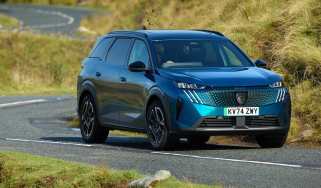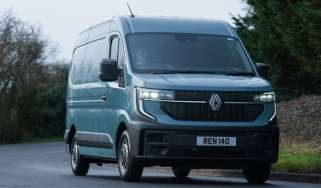What is a battery electric car (BEV) and how do electric cars work?
How do battery electric vehicles (BEVs), including electric cars, differ from petrol and diesel-engined vehicles? And how do they work? Read on to find out
With sales of electric cars (also known as ‘battery electric vehicles’, or BEVs) having increased by 76% during 2021 compared to 2020, thereby accounting for around 12.5% of all registrations, it’s safe to say that EVs are well on their way to becoming mainstream.
The much-publicised UK ban on the sale of new petrol and diesel-engined cars by 2030 means carmakers are responding by investing billions in new electric cars, so you can expect the proportion of electric-car sales to continue increasing dramatically.
With this in mind, it's likely that making the big switch to electric is already a consideration for many UK car buyers. Here, we explain what an electric car is and how they work.
How do electric cars work?
While conventional petrol or diesel-engined cars have an internal-combustion engine, the most obvious difference with an electric car is that it’s powered by one or more electric motors, fed energy by a large lithium-ion battery pack instead of from a fuel tank.
Lithium-ion batteries are by far the most common type used in electric cars today: these store electricity obtained from the grid by charging the car with a cable. Much like charging a mobile phone, an electric car is plugged into the grid, through either a home wallbox or a public charging unit.
The power from the battery is delivered to the electric motor through a controller, which in turn is connected to the throttle. The amount of throttle movement determines how much power the controller sends to the motor, which then determines how fast the car moves. Most electric cars also come with regenerative braking technology. With this, lifting off the throttle forces the electric motors to effectively run in reverse, recovering energy that's then converted into electricity and transmitted back into the car’s battery.
This has the effect of slowing an electric car down, and on some cars – such as the Nissan Leaf – it's strong enough to bring the car to a complete stop. Nissan calls its version the 'e-Pedal': the blanket term is 'single-pedal' driving, and cars that offer it can be driven almost without using the brake pedal at all.
Are electric cars manual or automatic?
Electric cars generally don’t feature a gearbox with multiple gears. This is because an electric motor delivers its maximum torque immediately. Electric motors also have a much larger working range than internal-combustion engines, so they don’t need gears to optimise performance and economy.
However, there’s still some hope for the future of the manual gearbox. Toyota has patented technology that may bring a simulated manual gearbox to electric cars. The only real benefit of this, though, would be driver enjoyment, as many drivers prefer the familiarity and engagement a manual transmission brings.
Advantages of electric cars
Electric cars have many advantages. The two biggest ones are much lower running costs than internal-combustion cars and zero tailpipe emissions. The first of these comes from the fact that electric vehicles don’t rely on diesel or petrol as their fuel, but on electricity, which is much cheaper.
While a litre of petrol or diesel costs close to £2 at the time of writing, the average UK electricity tariff is about 20p per kilowatt-hour as of early 2022. Although litres and kilowatt-hours aren’t directly comparable, you can compare the cost per mile to see just how efficient an electric vehicle is.
A full charge of a Kia e-Niro – which has a 64kWh battery – should cost around £13: with a range of 282 miles on paper, this works out at just under 5p per mile. In contrast, an equivalent petrol or diesel car would cost much more per mile. Over the course of a year, that really adds up.
The second advantage of electric cars is a lack of tailpipe emissions. While petrol and diesel combustion-engined cars emit carbon dioxide, nitrogen dioxide and other harmful pollutants, electric vehicles have zero tailpipe emissions. Not only does this improve air quality in busy city centres, but it also means owners of electric vehicles don't pay any vehicle excise duty (VED), or road tax – for the moment, at least.
Electric vehicles are also exempt from other taxes, such as the London Congestion Charge (until 2025) and the Ultra Low Emissions Zone payment. Company-car Benefit-in-Kind tax on electric cars is also fixed at 2%
Disadvantages of electric cars
One of the big concerns for any potential electric-vehicle owner is how far they can drive; known as a car's range. Early models had less than 100 miles of real-world range, often inducing a condition known as ‘range anxiety’ in drivers. But more modern electric vehicles can easily exceed 200 or even 300 miles.
Another disadvantage is charging time. A full charge of a standard 40kWh Nissan Leaf takes over 13 hours using a three-pin plug. Even a 50kW rapid charger takes over half an hour to charge the car. Conversely, a petrol or a diesel car is far quicker to fill up. Although charging speeds are increasing, even the fastest models will still take around 20 minutes to reach 80% battery capacity from near-empty.
Pros and cons
Whether an electric car is right for you is ultimately for you to decide. But it’s worth considering the following points. What kind or size of a car do you need? Do you do a lot of driving daily? Is your commute something that could feasibly be covered by an electric vehicle?
Also consider whether or not you have the facilities and space to charge at home. After all, current estimates show that 90% of all electric vehicles are charged at home. Do you have a garage or a driveway where you can plug in an electric vehicle? Could you install a home wallbox? These will help speed up the charging.
Most Popular

EV Deal of the Day: family-friendly Peugeot E-5008 for £261 per month

